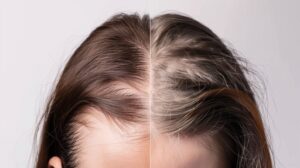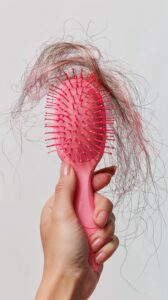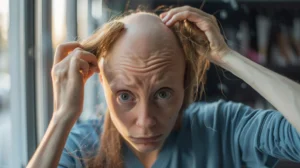Hair Loss
It’s typical to lose some hair every day as part of your hair’s usual growth cycle. For most people, the lost hair grows back, maintaining a full head of hair.
However, when more strands begin to shed than usual and new hair doesn’t grow back as effectively, it can lead to noticeable hair loss. Factors such as illness, hormonal changes, stress, aging, and inherited conditions can disrupt your hair’s growth cycle. As a result, more hair falls out, but new strands don’t always replace them.
Types of Hair Loss

Hair loss can be either permanent or temporary, and understanding the different types can help in managing and treating the condition. The most common types include:
- Androgenic Alopecia: Also known as hereditary baldness, this type can affect both men (male pattern baldness) and women (female pattern hair loss).
- Alopecia Areata: This autoimmune disease causes hair loss from the scalp and body, leading to patchy bald spots.
- Telogen Effluvium: Characterized by rapid hair shedding, this type typically occurs a few months after a physical or emotional stressor or sudden hormonal changes.
- Anagen Effluvium: This type of rapid hair loss is often due to certain medical treatments, such as chemotherapy, and affects the hair’s growth phase directly.
Causes and Symptoms of Hair Loss
Hair loss can result from a variety of causes, and its symptoms can vary widely. Understanding both can help in addressing the issue effectively.

Symptoms of Hair Loss
- Progressive Head Thinning:
– This is the most common type of hair loss, particularly as people age.
– In men, hair often begins to recede at the hairline on the forehead.
– Women typically experience a broadening of the part in their hair.
– An increasingly common pattern in older women is a receding hairline known as frontal fibrosing alopecia.
- Circular or Patchy Bald Spots:
– Some individuals lose hair in circular or patchy bald spots on the scalp, beard, or eyebrows.
– The skin in these areas may become itchy or painful before the hair falls out.
- Sudden Loosening of Hair:
– Physical or emotional shock can cause hair to loosen.
– Handfuls of hair may come out when combing, washing, or even after gentle tugging.
– This type of hair loss usually causes overall hair thinning but is often temporary.
- Full-Body Hair Loss:
– Certain conditions and medical treatments, such as chemotherapy for cancer, can lead to hair loss across the entire body.
– Typically, the hair grows back once the treatment is completed.
- Patches of Scaling That Spread Over the Scalp:
– This can be a sign of ringworm.
– It may be accompanied by broken hair, redness, swelling, and sometimes oozing.
Causes of Hair Loss

Hair loss has many possible causes, including:
- Genetics:
– Hereditary hair loss, which you inherit from your parents, is the most common cause.
- Scalp Infections:
– Fungal infections on the scalp can lead to hair loss.
Recommended Read: Grow Natural Hair With These Steps
Sexually Transmitted Infections
– Untreated sexually transmitted infections (STIs) can lead to hair loss. For example, syphilis, if left untreated, can cause patchy hair loss on the scalp, eyebrows, beard, and other areas. Other STIs may also contribute to hair loss.
4. Childbirth, Illness, or Stressful Events
– A few months after childbirth, recovering from an illness, or undergoing surgery, you may notice significantly more hair shedding. This can also occur after experiencing a stressful event, such as a divorce or the death of a loved one. Increased hair loss during these times is common.
5. Age:
– As we age, hair growth naturally slows, and many people experience some degree of hair loss. Over time, hair follicles may stop producing new hair, leading to thinning hair on the scalp. Additionally, hair often loses its color. Women may also notice a receding hairline as part of this natural aging process.
6. Hairstyles:
– Styles that pull the hair tightly, such as braids, hair extensions, or tight ponytails, can cause hair loss.
- Haircare Practices:
– Damage due to hair processing, including perms and bleach, can result in hair loss.
- Hormonal Changes:
– Events such as pregnancy, childbirth, or menopause can trigger hair loss.
9. Medical Treatments:
– Treatments like chemotherapy and certain medications can cause hair loss.
- Nutritional Deficiencies:
– Not getting enough iron or protein can lead to hair loss.
- Thyroid Disease:
– Appropriate medical treatment to regulate thyroid levels is crucial to minimize hair loss and promote regrowth. Thyroid disorders, such as hypothyroidism and hyperthyroidism, can cause hormonal imbalances that lead to thin, brittle hair that is more prone to falling out.
Hair Loss Prevention
Most baldness is caused by genetics, such as male-pattern baldness and female-pattern baldness, and is not preventable. However, you can take steps to avoid preventable types of hair loss:
– Handle with care: Be gentle with your hair. Use a detangler to avoid tugging when brushing and combing, especially when your hair is wet. A wide-toothed comb can help prevent hair from being pulled out. Avoid harsh treatments like hot rollers, curling irons, hot oil treatments, and perms. Minimize tension on your hair from styles that use rubber bands, barrettes, and braids.
– Review medications: Consult your doctor about any medications or supplements you take that might cause hair loss.
– Sun protection: Protect your hair from sunlight and other sources of ultraviolet light.
– Quit smoking: Some studies show an association between smoking and baldness in men.
– Chemotherapy considerations: If you are undergoing chemotherapy, ask your doctor about a cooling cap. This cap can help reduce your risk of losing hair during treatment.
Recommended Read: 5 Best Hair Shampoos for Dandruff and Damaged Hair
Frequently asked questions
What are the treatment options for hair loss?
Depending on the cause, hair loss has different treatment options. These can involve hair transplant surgery, laser therapy, lifestyle modifications, and drugs like minoxidil (Rogaine) and finasteride (Propecia). Getting advice from a medical expert can help you decide which course of action is best for your particular situation.
Is hair loss reversible?
Depending on the reason, hair loss may or may not be reversible. When the underlying reason for temporary hair loss, such as stress, illness, or hormonal changes, is treated, it is frequently possible to reverse it. Androgenetic alopecia, or genetic hair loss, can be slowed down or prevented with treatment, but it is usually irreversible.
When should I see a doctor about hair loss?
If you detect bald patches, experience abrupt or severe hair loss, or exhibit any symptoms of an underlying medical condition, such as scalp itching, redness, or scaling, it’s a good idea to visit a doctor. A medical expert can assist in determining the reason of your hair loss and suggest suitable courses of action.
How much hair loss is considered normal?
As part of the normal hair growth cycle, it’s typical to lose 50 to 100 hair strands per day. However, it can be worthwhile to speak with a medical practitioner if you start to see noticeably greater hair loss.
Can diet affect hair loss?
Yes, a person’s diet can have a big impact on their hair health. Hair loss may result from dietary deficits, particularly those involving iron, protein, and specific vitamins and minerals. A well-rounded diet full of vital minerals helps support continued healthy hair development.
Are there any natural remedies for hair loss?
Certain natural therapies, including giving your scalp a massage, utilizing essential oils (like peppermint or rosemary), and using gentle hair care products, can help prevent hair loss and maintain healthy hair. However, it’s crucial to use caution when using these treatments and speak with a healthcare provider for guidance relevant to your requirements.
Next Read: Grow Natural Hair With These Hair
Recommended Products to Help Regain & Prevent Temporary Hair Loss

